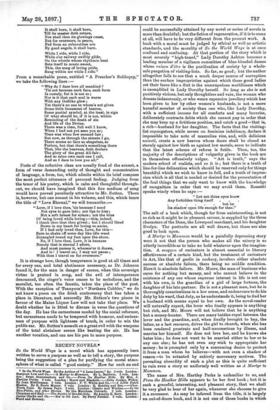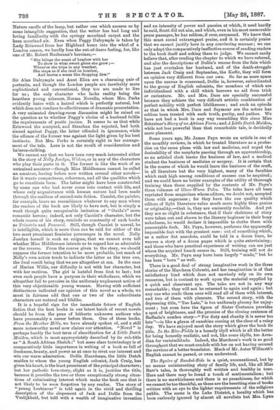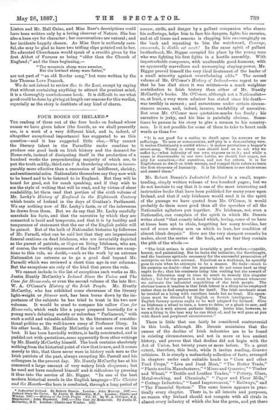RECENT NOVELS.* So the World Wags is a novel which
has apparently been written to serve a purpose as well as to tell a story, the purpose being the suggestion of a plan for purifying the moral atmo- sphere of what is called "good society." How far such an end
• So the World Wags. By the Author of .A Lone La " lo. 3 vols. London Sampson Low and Co. —A Martyr to Mammon. By L. Baldwin. S vols. Leo, don Swan Sonnensohein and Co.—From the Heather Halle By Mrs. J. Hartley Perk.. S vols. London Buret and Bleekett.—Nelly /mays, Widow. By Jean Middlemase. 3 vols. London : F. V. White and Co. —A Little Dutch Maiden. By B. Brute Money. 2 vols. London : B. Bentley and Son.—aloe- Worm Tales. By James Payn. 3 vole London Matto sod Windus.—/n the Bire•Fields, and other Stories. By the Marchese Oolombi. o vole. London Chapman and Hall—The Squire of Sandal-Side. By Amelia B. Barr. London : James Clarke and 0o.—Ses to the Last. By Percy Pendell. 3 vols. Landon Ward and Downey. could be successfully attained by any novel or series of novels is more than doubtful; but the fiction of regeneration, if it is to oome at all, will have to be very different from the present work. A book with a moral must be judged by ethical as well as artistic standards, and the morality of So the World Wage is at once confused and confusing. At that portion of the story which is most severely " high-toned," Lady Dorothy Ashton becomes a leading member of a vigilance committee of blue-blooded dames whose raison d'etre is the purification of society by a whole- sale purgation of visiting-lists. So far, so good ; but the author altogether fails to see that a mach deeper source of corruption than the surface improprieties against which these good ladies set their faces like a flint is the unscrupulous worldliness which is exemplified in Lady Dorothy herself. So long as she is not positively vicious, bat only thoughtless and vain, the woman who dresses indecorously, or who wears expensive jewellery which has been given to her by other women's husbands, is not a more harmful member of society than one who, like Lady Dorothy, with a sufficient income for all comforts and many luxuries, deliberately contracts debts which she cannot pay in order that she may keep up a fictitious position, and catch a good—that is, a rich—husband for her daughter. The facts that the visiting- list expurgators, while severe on feminine indelicacy, declare it impossible to take note of masculine vice, and, with delicious naivete, create a new heaven whose doors shall be closed as sternly against low birth as against low morale, seem to indicate that the latest scheme of reform is futile. Then, too, the majority of the descriptions of vulgarity given in the book are in themselves offensively vulgar. "Art is troth," says the modern school of realists, and so it is ; but there is a truth of line-for-line delineation which should be reserved only for things beautiful which we wish to know in full, and a truth of impres- sion which is all that is needed or desired for the presentation of the foul things that we only want to know with the knowledge of recognition in order that we may avoid them. Rossetti speaks wisely when he says:— " Let not thine eyes know
Any forbidden thing itself . . .
but be Its shadow upon life enough for thee."
The salt of a book which, though far from uninteresting, is not en rich as it might be in pleasant savour, is supplied by the three characters of the Dean, the Liverpool merchant, and his daughter Evelyn. The portraits are all well drawn, but these are also good to look upon.
A Martyr to Mammon would be a painfully depressing story were it not that the person who makes all the misery is so utterly incredible as to take no hold whatever upon the imagina- tion. A soupcon of caricature is almost essential to literary effectiveness of a certain kind, but the treatment of caricature in Art, like that of garlic in cookery, involves either absolute success or absolute failure, there being no middle condition. Here it is absolute failure. Mr. Moore, the man of business who cares for nothing but money, and who cannot believe in the existence of any one whose supreme interest in life is not one with his own, is the guardian of a girl of large fortune, the daughter of his late partner. He is not a pleasant man, but he is thoroughly conscientious in a low sense, and endeavours to do his duty by his ward, that duty, as he understands it, being to find her a husband with means equal to her own. As the novel-reader will naturally expect, the lover who finally appears is anything but rich, and Mr. Moore will not believe that he is anything but a money-hunter. There are many battles-royal between the lover and the guardian, and, when finally brought to bay, the latter, as a last resource, drives the girl to church, when she has been rendered prostrate and half-unconscious by illness, and marries her himself. He does not love her, and he knows she hates him ; he does not want to be married either to her or to any one else; he has not even any wish to appropriate her money : he is prompted only by a consuming desire to protect it from a man whom he believes—with not even a shadow of reason—to be actuated by entirely mercenary motives. The pervading absurdity of such a plot as this is quite sufficient to ruin even a story so uniformly well written as A Martyr to Mammon.
The name of Mrs. Hartley Perks is unfamiliar to us, and From the Heather Hills appears to be her first book ; but it is such a graceful, interesting, and pleasant story, that we shall be very glad to hear of her again, whenever she chooses to give it a successor. As may be inferred from the title, it is largely an out-of-doors book, and it is not one of those books in which Nature smells of the lamp, but rather one which assures ns by some intangible suggestion, that the writer has bad long and loving familiarity with the springy moorland carpet and the keen moorland air. Even when Peggy Dalrymple is taken by Lady Erinwood from her Highland home into the whirl of a London season, we hardly lose the out-of-doors feeling, for, like one of Mr. Robert Buchanan's heroines,—
" She brings the soent of heather with her
To show in what sweet glens she grew ;— Where'er she trips in any weather, She steps as if she trod on heather, And leaves a sense like dropping dew."
Sir Alan Dalrymple and Aunt Eliza are a charming pair of portraits, and though the London people are inevitably more sophisticated and conventional, they too are made to live for us ; the only character who lacks reality being the heartless yonng schemer, Norma Novella, whom Mrs. Perks -evidently hates with a hatred which is perfectly natural, but which does not conduce to effectiveness of dramatic presentation. A very animated drawing-room discussion might be raised on the question as to whether Peggy's choice of a husband fulfils the requirements of poetic justice. It seems to us that while- Erinwood the accepted, and Strachan the rejected, had both sinned against Peggy, the latter offended in ignorance, while the offence of the former was against the light given by his best instincts. Bat Mrs. Perks is certainly right in her manage- ment of the tale. Love is not the result of consideration and balance-striking.
We cannot say that we have been very much interested either in the story of Nelly Jocelyn, "Widow, or in any of the characters who play their parts in it. The former is like the work of an untrained amateur—though Miss Middlemass cannot be called an amateur, having before now written several other novels— for it wants compactness, coherence, and all the qualities which go to constitute form. The latter might have been constructed by some one who had never come into contact with life, and whose only acquaintance with human nature had been made through the medium of second-rate fiction. Cazalet, the painter, for example, bears no resemblance whatever to any man whom the readers of the book are likely to have met, but is simply a weak though quite recognisable imitation of " Ooida's" more romantic heroes; indeed, not only Cazalet's character, but the whole course of his story, reminds us constantly of such books as Tricotrin and Pascarel. Still, though Cazalet is unreal, he is intelligible, which is more than can be said for either of the two most prominent feminine personages in the novel. Holly Jocelyn herself is such an enigma, that we cannot even tell whether Miss Middlemass intends us to regard her as admirable or the reverse. From the course given to the story, we should -suppose the former intention to be more probable, but much of Nelly's own action tends to indicate the latter as the true one, the final result being that we are altogether at sea. In the case 43f Marian Willis, our difficulty is not with her character, but with her motives. The girl is hateful from first to last ; but even such people have a purpose in their wickedness, which we altogether fail to perceive in the uniformly unpleasant action of this very objectionable young woman. Having with sufficient distinctness indicated our opinion of this novel as a whole, we must in fairness add that one or two of the subordinate characters are natural and lifelike.
It is a hopeful sign for the immediate future of English fiction that the best books in our latest batch of recent novels should be from the pens of hitherto unknown authors who have presumably a career before them. One of these books, From the Heather Hills, we have already spoken of, and a still more noteworthy novel now claims our attention. "Novel" is perhaps hardly the best term of classification for A Little Dutch Maiden, which is most appropriately described by its sub-title as "A South African Sketch:" but mere class terminology is of oomparatively little importance in writing of a book so fall of freshness, beauty, and power as at once to rivet our interest and win our warm admiration. Dolls Haardman, the little Dutch maiden to whom the young English colonist, Jack Craig, has given his heart, is the least prominent of the principal characters; but her pathetic love-story, slight as it is, justifies the title, because it provides the two or three exceptionally strong situa- tions of culminating interest which make the book one that is not likely to be soon forgotten by any reader. The story of
young Loohinvar " is told again in the vivid and thrilling description of the elopement of Jack and borne from the Vrolijkheid, but told with a wealth of imaginative invention and an intensity of power and passion at which, it need hardly be said, Scott did not aim, and which, even in his most memorable prose passages, he has seldom, if ever, surpassed. We know that this must sound extravagant praise, and it is certainly praise that we cannot justify here in any convincing manner ; we can only adopt the comparatively ineffective course of sending readers to the book itself and asking them to judge. We cannot easily believe that, after reading the chapter to which we have referred, and also the descriptions of Dollie's rescue from the fats which has just overtaken her husband, and of the death-struggle between Jack Craig and September, the Kaffir, they will form an opinion very different from our own. So far as mere space upon the canvas is concerned, Dolls is, however, subordinated to the group of English colonists, the members of which are individualised with a skill which borrows no aid from trick or caricature. Mr. and Mrs. Dare are specially successful because they achieve the very difficult artistic combination of perfect nobility with perfect lifelikeness ; and such an episode as that in which Mrs. Dare and Seymour are the actors has seldom been treated with such truth, purity, and pathos. We have not had a book in any way resembling this since Miss Schreiner's Story of an African Farm; and A Little Dutch Maiden, while not lees powerful than that remarkable tale, is decidedly more pleasant.
Some years ago, Mr. James Payn wrote an article in one of the monthly reviews, in which he treated literature as a profes- sion on the same plane with law and medicine, and urged the desirability of the neophyte passing through an apprenticeship, as an articled clerk learns the business of law, and a medical student the business of medicine or surgery. It is certain that in the course of which he would learn the business of the craft, in all literature but the very highest, many of the faculties which rank high among conditions of success can be acquired; and we could have no better examples of the utility of thorough training than those supplied by the contents of Mr. Payn's three volumes of Glow-Worm Tales. The tales have all been reprinted from magazines whose editors, we doubt not, accepted them with eagerness ; for they have the one quality which editors of light literature value much more highly than genius or originality,—that is, they are eminently readable. And yet they are so slight in substance, that if their skeletons of story were taken out and shown to the literary beginner in their bony nakedness, be would declare it impossible to clothe them with presentable flesh. Mr. Payn, however, performs the apparently impossible feat with the greatest ease out of something which, as a rather flat anecdote, could be told in a dozen lines, ho weaves a story of a dozen pages which is quite entertaining; and those who have practical experience of writing can see just where the acquired knack comes in. Still, training will not do everything. Mr. Payn may have been largely "made," but ho has been " born " as well.
There is a good deal of strong imaginative work in the three stories of the Marchesa Columbi, and her imagination is of that satisfactory kind which does not unwisely rely on its own resources, but is content to work upon the material supplied by a quick and observant eye. The tales are not in any way remarkable ; they will not be returned to again and again ; but any one who reads them once will read all of them with interest, and two of them with pleasure. The second story, with the depressing title, "Too Late," is too uniformly gloomy for enjoy- ment; but even here the figure of Sister Costanza provides a spot of brightness, and the promise of the closing sentence of Raffaela's sombre story—" For duty and charity it is never too late "—is like a gleam of sunshine coming at the close of a rainy day. We have enjoyed most the story which gives the book its title. In the Rice-Fields is a homely idyll which is all the better for being honestly realistic, and not, like some idylls, too Arca- dian for verisimilitude. Indeed, the Marchesa's work is so good throughout that we must condole with her on not having secured the services of a better translator. Much of Mr. Astor Willmott's English cannot be parsed, or even understood.
The Squire of Sandal-Side is a quiet, unsensational, but by no means uninteresting story of family life, and, like all Miss Barr's tales, is thoroughly well written and healthy in tone. Here and there may be found a touch of sentimentalism; but there is no mawkishness and there is no preachiness, for which we cannot be too thankful, as these are the besetting sins of books written with an eye to the lighter requirements of the religions public. The scene is the Lake District, a locality.which has been curiously ignored by almost all novelists but Mrs. Lynn
Linton and Mr. Hall Caine, and Miss Barr's descriptions could have been written only by a loving observer of Nature. She has also a keen eye for character ; her conversations are natural; and her incidents happily chosen. As Miss Barr is uniformly care- ful, she may be glad to have two trifling slips pointed out to her. No educated Churchman would speak of a crucifix given by the first Abbot of Furness as being "older than the Church of England ;" and the lines beginning,—
" The mountain sheep were sweeter,
But the lowland sheep were fatter,"
are not part of "an old Border song," but were written by the late Thomas Love Peacock.
We do not intend to review Sex to the Last, except by saying that without containing anything to attract the prurient mind, it is a thoroughly unwholesome book. It is difficult to see what good could be done by giving at length our reasons for this verdict, especially as the story is destitute of any kind of charm.




































 Previous page
Previous page